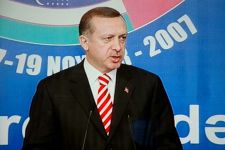Azerbaijan, Baku /corr. Trend S.Ilhamgizi, E.Huseynli / The Prime Minister of Turkey, Rajab Tayyub Erdogan, accused the foreign countries and international organizations of non-settlement of the Nagorno-Karabakh conflict. "Nagorno-Karabakh is wound for all of us," the Prime Minister said during the 11th conference of friendship, fraternity and cooperation of the Turkic nations and societies in Baku on 17 November.
The 11th conference of friendship, fraternity and cooperation of the Turkic nations and societies began in Baku on 17 November. The Congress brings together nearly 550 delegates from 30 countries, including the President of Azerbaijan, Ilham Aliyev, Prime Minister of Turkey, Rajab Tayyub Erdogan and high-ranking governmental representatives of the Turkic-speaking states.
The Congress is aimed at strengthening friendly, fraternal and co-operation relations amongst the Turkic countries and communities, ensuring information exchange amongst them, propagating richness of the Turkic culture, developing bilateral economic co-operation and seeking joint ways of resolving the general problems of the Turkic peoples.
The President of Azerbaijan said that combining their opportunities, the Turkic countries should become stronger.
The Prime Minister of Turkey said that it is open injustice that more than one million Azerbaijanis have become refugees and internally displaced persons in their own country. However, the international community does not give any reaction to it. "We always follow how the world countries play a game with us," the Prime Minister added.
Erdogan said that the OSCE Minsk Group co-chaired by the USA, France and Russia always pursues diverting policy in settling Nagorno-Karabakh conflict.
" Turkey will always be at Azerbaijan in releasing occupied lands," the Prime Minister said.
The conflict between the two countries of the South Caucasus began in 1988 due to Armenian territorial claims against Azerbaijan. Since 1992, Armenian Armed Forces have occupied 20% of Azerbaijan including the Nagorno-Karabakh region and its seven surrounding districts. In 1994, Azerbaijan and Armenia signed a ceasefire agreement at which time the active hostilities ended. The Co-Chairs of the OSCE Minsk Group (Russia, France, and the US) are currently holding peaceful negotiations.







